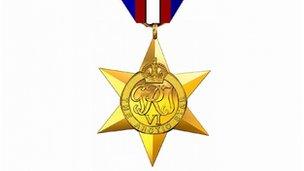Medal and clasp for Arctic convoy and bomber veterans
- Published

More than 3,000 men died in the freezing waters of the Arctic during World War II
Veterans who served on Arctic convoys and in Bomber Command during World War II are to be recognised for their bravery and service with a new medal and award.
The Ministry of Defence said it had agreed on a design for the new Arctic Star medal and Bomber Command clasp.
The honours could be sent out to veterans and their families as soon as next month.
Surviving veterans and widows will be the first to receive the awards.
The families of those who served will also be able to apply.
More than 3,000 men died in the freezing waters of the Arctic as they worked to keep supplies flowing through German blockades to Britain's ally, the Soviet Union, in Operation Dervish.
The death toll of those serving in Bomber Command was even greater with 55,000 airmen losing their lives.
'Worst journey'
A quarter of a million men did survive both these dangerous missions - though many have since died.
Seventy years on their bravery is being recognised with the Arctic Star medal for those who sailed on the convoys and the Bomber Command clasp for those who flew at least one operational mission over Germany and France.
The Bomber Command clasp will attach to the 1939 to 1945 Star for which those veterans had previously qualified.
The announcement was made in a statement by defence minister Mark Francois on Tuesday.
He said: "All those who served our country in Bomber Command and on the Arctic Convoys deserve nothing but the utmost respect and admiration from us.
"That's why I am delighted that these special individuals will in the next few weeks begin to receive the Bomber Command clasp and Arctic Star that they have so long deserved.
"I am also pleased to announce that the families of those no longer alive will also be able to apply for these awards in recognition of their loved one's bravery."
The final designs were agreed following extensive consultation after Prime Minister David Cameron announced the awards in December.
Mr Cameron said he had accepted the recommendations of a review of military medals carried out by former diplomat Sir John Holmes. The decision followed a long campaign.
The mission to keep supply lines to the Soviet ports of Murmansk and Archangel open was reportedly described as the "worst journey in the world" by former Prime Minister Winston Churchill.
'Numbers depleting'
Russia has previously wanted to present its own Ushakov Medal to Britons who had served on the convoys, but the move was blocked by the UK Foreign Office (FCO).
The British government said its rules on foreign awards meant permission could not be granted if veterans had received or were expected to receive a UK medal for the same services.
The FCO added that prior to the announcement of a specific award for the Arctic convoys, all British veterans were eligible for the Atlantic Star. This was awarded for service in the Atlantic and home waters, including the north Russian convoys.
Convoy veteran Alec Penstone, from Shanklin, Isle of Wight, welcomed the news about the medal but said the government should also allow Russia to present its own medal to veterans.
He said: "In the first week in March I'm attending two funerals of shipmates of the Arctic conveys who have both crossed the bar.
"Of course, every day our numbers are depleting, I think the last count was about 59 of us left in the UK.
"The news is good... that we are going to receive the Arctic campaign medal. But the one that we are determined to get hold of is the Russian bravery award, which is not costing our government one penny piece."
An MoD spokesman said: "Priority for the new awards will be given to applications from veterans and widows. Other next of kin are also able to apply and they will receive their awards shortly after veterans and widows."
- Published26 February 2013
- Published30 January 2013
- Published31 August 2011
- Published19 December 2012